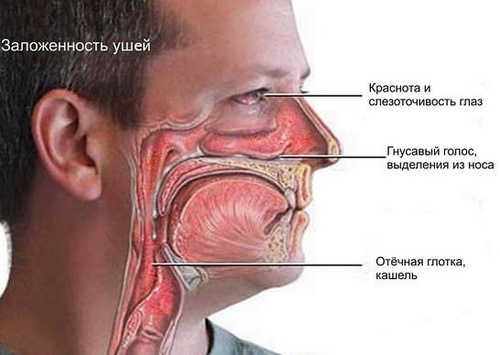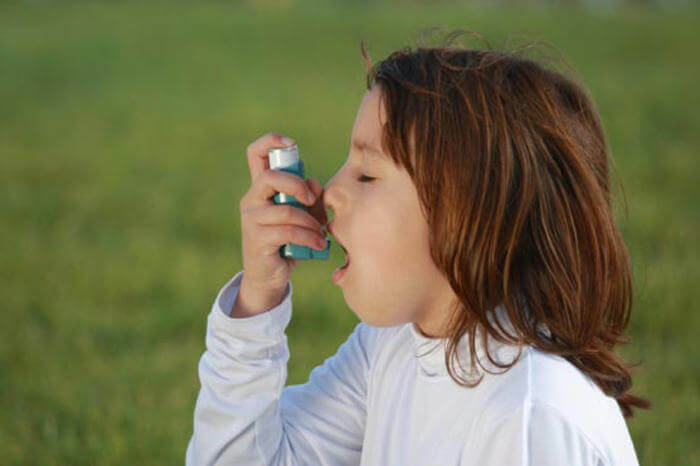Than to treat an allergic rhinitis?

Allergic rhinitis( rhinitis) is an inflammatory process that occurs in the mucous membranes of the nose, oropharynx, caused by the reactions of the body's hypersensitivity to certain substances, microorganisms, odors.Every year, rhinitis becomes an increasingly common problem that occurs with various diseases and in the form of an isolated disease.
According to statistics, about a quarter of the population in Russia as well as in other countries applies to doctors about allergic rhinitis.
What causes development of allergic rhinitis Symptoms of an allergic rhinitis How to determine allergic rhinitis, diagnosis of the disease Treatment of an allergic rhinitisWhat are the causes of the development of allergic rhinitis
The main reason for the development of this ailment is a violation of the immune system reaction of the body.Acute rhinitis develops according to the principle of the hypersensitivity reaction to the stimulus.If you get on the mucous membranes of the respiratory tract of the allergen, after a few seconds or minutes, an allergic reaction of an immediate type begins.
The most common allergens that cause rhinitis:
- dust( road, house, book);
-
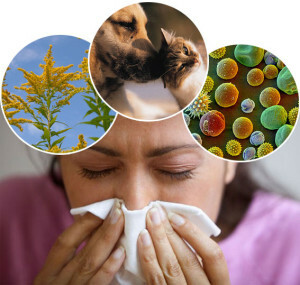 small mites and spores of protozoa that are in the air and dust;
small mites and spores of protozoa that are in the air and dust; - products of vital activity of insects;
- down, wool and smell of animals and birds;
- dry food for aquarium fish and animals;
- vegetable pollen;
- tobacco smoke;
- some types of mold;
- medicinal substances in the form of aerosols;Odor on industrial production, etc.
- .
In the development of allergic rhinitis, hereditary predisposition to this ailment is very important.
Symptoms of an allergic rhinitis
Manifestations of an allergic rhinitis start suddenly with development:
- edema of the nasal mucosa with abundant release of watery mucus;
- paroxysmal sneezing;
- with difficulty breathing;
- itching sensations in the nasopharynx;
- reddening of sclera and mucous eyes, lacrimation, itching.
The attack can last several minutes, hours, and even a day, after the end of it in most cases the complaints leave without consequences.
Allergic rhinitis is often seasonal.In the case of the process, it occurs at any time of the year and lasts for several months or even years.Both adults and children are affected.
Allocate three degrees of severity of allergic bronchitis( mild, moderate and severe).
In some patients, allergic rhinitis is accompanied by a psychogenic component that aggravates or provokes an attack.
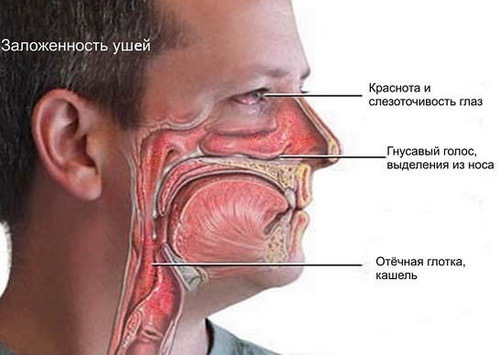
How to identify allergic rhinitis, diagnosis of the disease
The definition of the disease is not difficult.The diagnosis is made on the basis of examination of the patient, collection of characteristic complaints, clinical blood analysis data, immunological data, specific allergic tests.
In the general analysis of blood, the excess of the norm of the number of eosinophils plays a role.
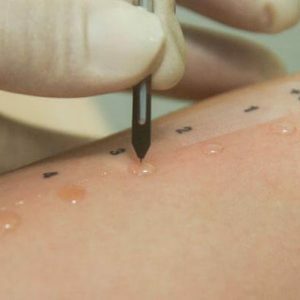 The most informative and simple analysis of is the skin allergenic assays, m . The procedure for carrying out these procedures is simple: 1-2 drops of the tested allergen are applied to the forearms specially applied to the skin, after half an hour the reaction is evaluated.According to the obtained hyperemia, reaction area and other manifestations, a conclusion is made about the effect of the substance on humans.Thus, the allergenic substance for a given person is determined.The analysis is inexpensive, it is carried out quickly and practically without contraindications.The necessary requirement - the refusal of taking antihistamines for a few days before the study.Also, the study is not recommended for pregnant women and people after reaching the age of fifty.
The most informative and simple analysis of is the skin allergenic assays, m . The procedure for carrying out these procedures is simple: 1-2 drops of the tested allergen are applied to the forearms specially applied to the skin, after half an hour the reaction is evaluated.According to the obtained hyperemia, reaction area and other manifestations, a conclusion is made about the effect of the substance on humans.Thus, the allergenic substance for a given person is determined.The analysis is inexpensive, it is carried out quickly and practically without contraindications.The necessary requirement - the refusal of taking antihistamines for a few days before the study.Also, the study is not recommended for pregnant women and people after reaching the age of fifty.
Immunological analysis. Based on the definition of immunoglobulins( specific proteins), which are released in large amounts by the body to a certain allergenic substance.By the amount of Ig( E), you can identify the allergen itself.
Recommended to read:Note: the lack of immunoassay is expensive.
Additional methods sometimes use rinomanometry - a study that can be used to judge nasal passages, radiographs of the sinus of the nose, bacteriological smear of of the nasal mucosa to establish a pathogenic microflora.
Treatment of allergic rhinitis
Allergic rhinitis should be treated only by a doctor after an accurate diagnosis.Self-medication and self-diagnosis can harm a patient's health.To begin treatment it is necessary with elimination of hit of an allergen, even temporary.
Methods of treatment are applied separately, or in a complex, depending on the type of rhinitis and the form of gravity.The task of therapeutic measures is to reduce the allergenic effect of substances that cause the manifestation of the disease, remove edema and inflammatory process, normalize the reaction of the immune system.
In the treatment of allergic rhinitis apply:
- antihistamine therapy - drugs that help reduce allergic manifestations.If necessary, you can use the funds as the first( Diazolin, Calcium Chloride), so the second( Cetrin, Kestin) and the third( Telfast, Zirtek) generations.Treatment with antihistamines should be continued until the full withdrawal of allergy manifestations, usually the course of treatment is 2 weeks;
-
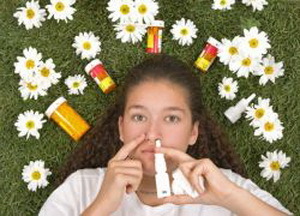 preparations of local treatment of allergic reactions - Cromosol, in the form of an aerosol spray, which helps to stabilize mast cells, the destruction of which leads to the release of histamine leading to allergic complaints in case of allergy.A similar effect has Cromoglin and Cromogexal( preparations of Sodium Cromoglycate).These drugs are prescribed for injection into the nasal cavity 3 times a day.It is important to remember that the effect develops a few days after the start of application.The course of treatment can be extended up to several months;
preparations of local treatment of allergic reactions - Cromosol, in the form of an aerosol spray, which helps to stabilize mast cells, the destruction of which leads to the release of histamine leading to allergic complaints in case of allergy.A similar effect has Cromoglin and Cromogexal( preparations of Sodium Cromoglycate).These drugs are prescribed for injection into the nasal cavity 3 times a day.It is important to remember that the effect develops a few days after the start of application.The course of treatment can be extended up to several months; - Nasaval spray is one of the new drugs that has been widely used in allergic rhinitis.Forms on the nasal mucosa a gel-like film that prevents direct contact of allergens with the tissues of the nasal membranes, and also reduces the development of an allergic reaction;
- nasal corticosteroids( Baconase, Nazarel, etc.) These drugs are used in severe cases of allergic rhinitis.Only a doctor can prescribe them.Self-use is strictly forbidden( !);
- Vessoconstrictors( Naphthysine, Sanorin).Used as symptomatic treatment for a short time - 5-7 days;
- allergen-specific desensitization is a method of treatment in which the allergist doctor enters a gradually increasing dose of the basic allergen to the patient.It is used with minimal concentration, which does not give the expressed manifestations of allergy.Thus, the patient gradually develops tolerance( tolerance) of the allergen.The method is fairly simple, but requires a certain amount of time.Its effectiveness is very high;
- Surgical treatment - shown in cases of anatomical problems that promote the development of allergic rhinitis.
Treatment of allergic rhinitis with traditional medicine
 Important: treatment at home is only ancillary.Cure of the disease only through the methods of traditional medicine is impossible!
Important: treatment at home is only ancillary.Cure of the disease only through the methods of traditional medicine is impossible!
The aforementioned therapeutic measures can be supplemented by washing the nose with a weak hypertonic salt solution, prepared on warm boiled water in a ratio of 200 ml of water and 7-8 g of salt( one and a half teaspoons).
Treatment of allergic rhinitis in pregnant women
In pregnant women, treatment of allergic rhinitis should be carried out very cautiously, corticosteroids and desensitizing drugs are prescribed only in severe cases, due to the possibility of their damaging effect on the developing baby.It is acceptable to use Sodium Cromoglycate preparations.
Features of the course and treatment of allergic rhinitis in children
In childhood, allergic rhinitis occurs more often against a background of more serious diseases - atopic dermatitis, bronchial asthma, etc.
Treatment is best performed with immune desensitizing therapy, since most drugs are toxic inChildhood.
In the absence of treatment of allergic rhinitis, pathology in children can progress and lead to complications - bleeding, loss of smell and taste, upper respiratory tract inflammation, chronic cough and perspiration in the oral and nasopharynx.
Features diet and lifestyle
 Certain diets in this disease does not exist, however, it is worth sticking to several useful tips.Naturally, if the food allergen, then it must be excluded from the diet.It is necessary to refrain from fried, an abundance of seasonings, alcohol and exotic dishes.
Certain diets in this disease does not exist, however, it is worth sticking to several useful tips.Naturally, if the food allergen, then it must be excluded from the diet.It is necessary to refrain from fried, an abundance of seasonings, alcohol and exotic dishes.
At home, households need to do more wet cleaning than usual, and clean the places where dust accumulates the most dust.In general, it is advisable not to buy carpets, furniture with toxic coating for life, minimize plastic surfaces, which have become widely used in recent times.The dwelling is often ventilated, maintain a temperature balance and a moisture regime.Effective to remove dust, household air filters.It is not necessary to get sick pets with allergic rhinitis.
Prognosis and prophylaxis for allergic rhinitis
Recommended to read:The prognosis for life and recovery is favorable.Correctly organized treatment and life regimen allow to completely get rid of manifestations of allergic rhinitis or significantly reduce the number of relapses.Specific prophylaxis is absent.
The patient should avoid contact with the underlying allergen, even during remission.
Alexander Lotin, medical reviewer

